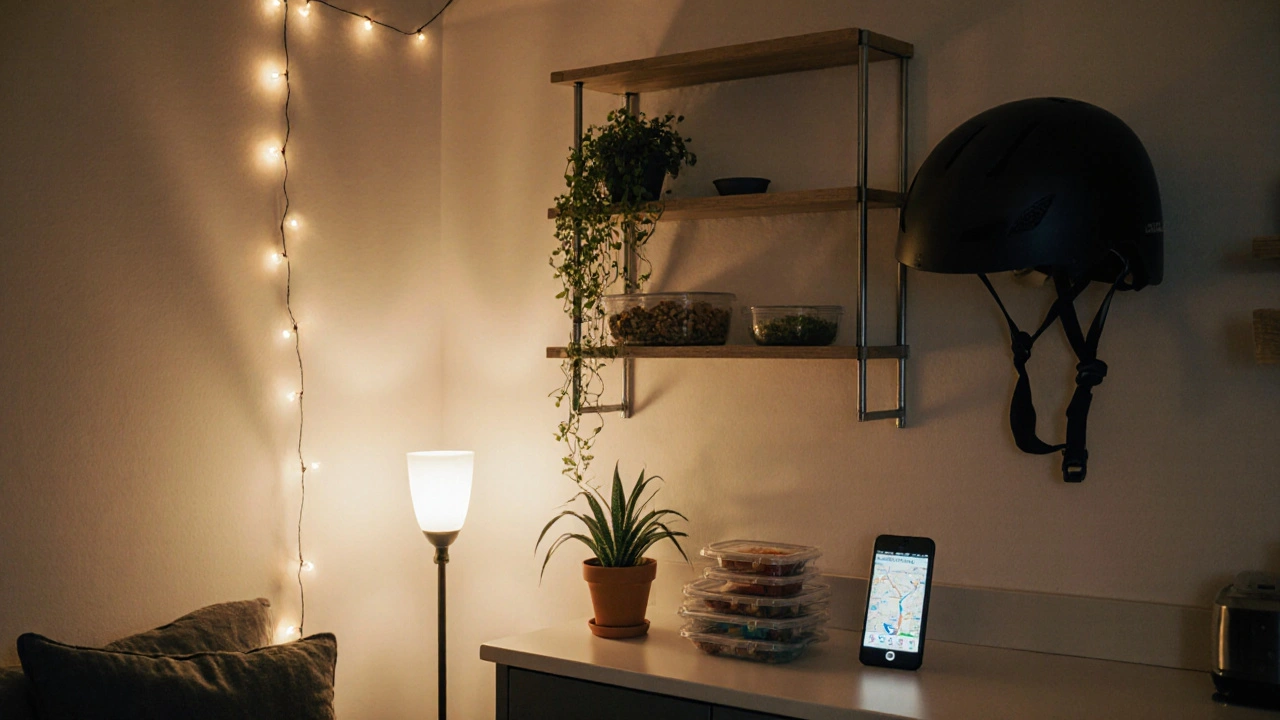Living in a big city isn’t just about skyscrapers and late-night diners. It’s about learning how to move through noise, money, and people without losing yourself. If you’ve ever felt overwhelmed by the pace, the cost, or the sheer size of a metropolis, you’re not alone. Millions of people wake up every day in cities like New York, Chicago, or Los Angeles and ask the same question: how do I make this work?
Big City Life Starts With a Realistic Budget
You can’t fake your way through rent in Manhattan, San Francisco, or even Atlanta. The average one-bedroom apartment in the top 10 U.S. cities costs between $2,100 and $3,800 a month. That’s not a typo. And that’s before utilities, internet, groceries, or transit. Most people underestimate this. They think, "I’ll just cut back on coffee." But coffee isn’t the problem. The problem is that your paycheck has to cover a whole system you didn’t design.Start with the 50/30/20 rule, but tweak it for the city. In urban areas, housing often eats 50-60% of your income. That means you need to adjust the rest: 20% for savings, 20-30% for everything else. If you’re making $60,000 a year, that’s $5,000 a month. Rent might be $3,000. That leaves $2,000 for food, transit, phone, gym, and emergencies. No room for impulse buys. No room for "I’ll pay it next month."
Track every dollar for three months. Use a free app like Mint or even a simple spreadsheet. You’ll find patterns: you spend $120 a month on Uber Eats, $80 on subway passes you don’t need because you walk more than you think, $50 on random Amazon orders because you’re bored. Fix those, and you’re already ahead of 70% of city dwellers.
Transportation: Don’t Own a Car, Own a Routine
Buying a car in a big city is a financial trap. Insurance alone can cost $200 a month. Parking? $300-$600. Gas? $100. Maintenance? Another $150. That’s $800+ a month just to sit in traffic. Meanwhile, public transit in most major cities runs every 5-15 minutes, 24/7. In New York, a MetroCard gives you unlimited rides for $132 a month. That’s less than a single parking spot.Combine transit with walking and biking. Most city centers are walkable. You don’t need to drive to the grocery store if it’s 15 minutes away on foot. In Chicago, the Divvy bike system costs $15 a month for unlimited 30-minute rides. Use it for short trips. It’s faster than waiting for a bus, cheaper than Uber, and keeps you healthy.
Pro tip: Download Citymapper or Google Maps Transit. It shows you real-time options-bus, subway, scooter, walk-and tells you which one gets you there fastest. No more guessing. No more wasting time.
Food: Eat Well Without Breaking the Bank
Fast food isn’t the enemy. It’s the default. And that’s why so many people feel sluggish, bloated, or stressed. But you don’t need to cook every meal to eat well.Look for local markets. In Los Angeles, the Grand Central Market offers fresh produce, tacos, dumplings, and smoothies-all under $10. In Philadelphia, Reading Terminal Market has a $7 breakfast sandwich that beats any chain. These aren’t tourist traps. They’re where locals eat.
Meal prep on Sundays. Cook a big pot of beans, rice, and roasted veggies. Portion it into containers. That’s five lunches done. No more $18 salads from the corner place. You’ll save $70 a week and feel better.
Also, learn the 10-minute meal rule: if you can throw together a meal in 10 minutes with ingredients you already have, you’re winning. Scrambled eggs with spinach and toast. Canned tuna on whole grain. Stir-fry with frozen veggies and soy sauce. These aren’t fancy. They’re smart.

Space: Make Your Apartment Feel Like Home
Your studio might be 400 square feet. That’s smaller than a two-car garage. But you can still make it feel spacious, calm, and yours.Use vertical space. Wall shelves, hanging organizers, over-the-door hooks. A $20 pegboard can turn your kitchen wall into a tool station. A $15 tension rod under your sink holds cleaning supplies. No clutter on the floor means more room to move.
Lighting matters more than you think. Harsh overhead lights make small spaces feel like a hospital. Add a floor lamp, a string of fairy lights, or a smart bulb you can dim. Warm light = cozy. Cold light = stress.
Plants help. Not just for looks. A snake plant or pothos cleans the air, needs almost no care, and makes you feel less trapped. One plant. That’s all you need.
Social Life: Build Connections Without the Noise
Cities are full of people-but lonely. You can sit next to 50 strangers on the subway and still feel invisible. The trick isn’t to go out more. It’s to go out differently.Join a free class. Libraries, community centers, and even gyms offer them: yoga, writing, pottery, language exchange. You’re not there to "network." You’re there to learn. And when you learn with others, friendships form naturally.
Volunteer. Animal shelters, food banks, literacy programs-they’re always short-staffed. You get purpose. You meet people who care about more than parties or Instagram likes. And you realize: most people in the city are just trying to get by, too.
Don’t force it. You don’t need 100 friends. You need three who show up when you’re tired. One who texts "You okay?" when you haven’t replied in two days. That’s the urban social life that lasts.

Health: Move, Sleep, Breathe
You think you’re too busy to sleep? You’re not. You’re just choosing wrong.City noise is real. Traffic, sirens, neighbors, construction. Use white noise machines, earplugs, or a fan. Sleep is non-negotiable. 7 hours. Every night. Skip the late-night scrolling. Put your phone in another room. Your brain will thank you.
Move every day. Not "work out." Just move. Walk 10 minutes after lunch. Take the stairs. Dance while you cook. In cities, movement is free. You don’t need a gym membership. You need to get out of your chair.
And breathe. Seriously. Deep breathing reduces stress faster than any app. Inhale for 4 seconds. Hold for 4. Exhale for 6. Do it three times. You’ll feel calmer. It works in line at the DMV. It works on the subway. It works when your boss emails at midnight.
When It Gets Too Much
There will be days when the city feels like it’s crushing you. The rent increase notice. The job rejection. The 14-hour workday. The endless construction noise. That’s normal.Get out. Not just for a weekend. For a day. Take a train 90 minutes away. Go to a small town. Sit by a lake. Walk in a forest. Breathe air that doesn’t smell like exhaust. You don’t need to move. You just need to remember: the city isn’t your whole life. It’s just where you live right now.
Big city life isn’t about having it all. It’s about choosing what matters-and letting go of the rest. You don’t need the fanciest apartment. You need a place where you can rest. You don’t need the trendiest restaurant. You need food that fuels you. You don’t need to be seen. You just need to feel seen by someone who’s still awake at 2 a.m., scrolling, wondering if they’re doing it right.
You are.
Is big city life worth the cost?
It depends on what you value. If you want access to jobs, culture, diversity, and convenience, then yes. But if you expect peace, low rent, and quiet, you’ll be disappointed. Big city life rewards adaptability, not comfort. The cost isn’t just money-it’s your energy, your time, and your patience. But for many, the trade-off is worth it.
How do I find affordable housing in a big city?
Look outside the downtown core. Neighborhoods just one or two subway stops away often have 20-40% lower rent. Check Facebook Marketplace, Zillow filters for "no fee," and local housing nonprofits. Roommates help, but only if you’re upfront about expectations. Avoid leases with hidden fees. Always read the fine print.
Can I survive on a minimum wage job in a big city?
It’s extremely difficult, and in most cities, nearly impossible without government aid or multiple jobs. Minimum wage in New York is $15/hour. That’s $31,200 a year before taxes. Rent alone in a shared apartment can cost $1,200/month-that’s $14,400. After taxes, transit, food, and phone, you’re left with almost nothing. Most people rely on food banks, public transit passes, or family support. If you’re in this situation, look for job training programs or unionized work-they often pay better.
What are the biggest mistakes people make moving to a big city?
Moving without a financial buffer. Thinking you’ll find a job after you arrive. Ignoring the commute. Believing you need to keep up with everyone else’s lifestyle. And not learning how to say no. The city will push you to spend, to hustle, to perform. You don’t have to. Your worth isn’t measured by your salary, your apartment size, or your social media likes.
How do I avoid burnout in a fast-paced city?
Build routines that protect your energy. Block off time to do nothing. Turn off notifications after 7 p.m. Take one full day off each week-no work, no scrolling, no obligations. Walk without your phone. Sit in a park. Read a physical book. Burnout doesn’t happen from working hard. It happens from never stopping.
Is it possible to live sustainably in a big city?
Yes-and it’s often easier than in suburbs. Public transit, bike lanes, recycling programs, and bulk food stores are more accessible. Bring your own bags. Buy secondhand. Use refill stations for soap and detergent. Support local farmers’ markets. Cities generate waste, but they also offer solutions. You don’t need to be perfect. Just be consistent.
Big city life doesn’t reward the loudest. It rewards the steady. The ones who show up, even when they’re tired. The ones who cook their own meals, walk instead of drive, and still find joy in a quiet morning with coffee and no rush. You don’t have to love every part of it. Just learn to live in it-on your terms.


Write a comment